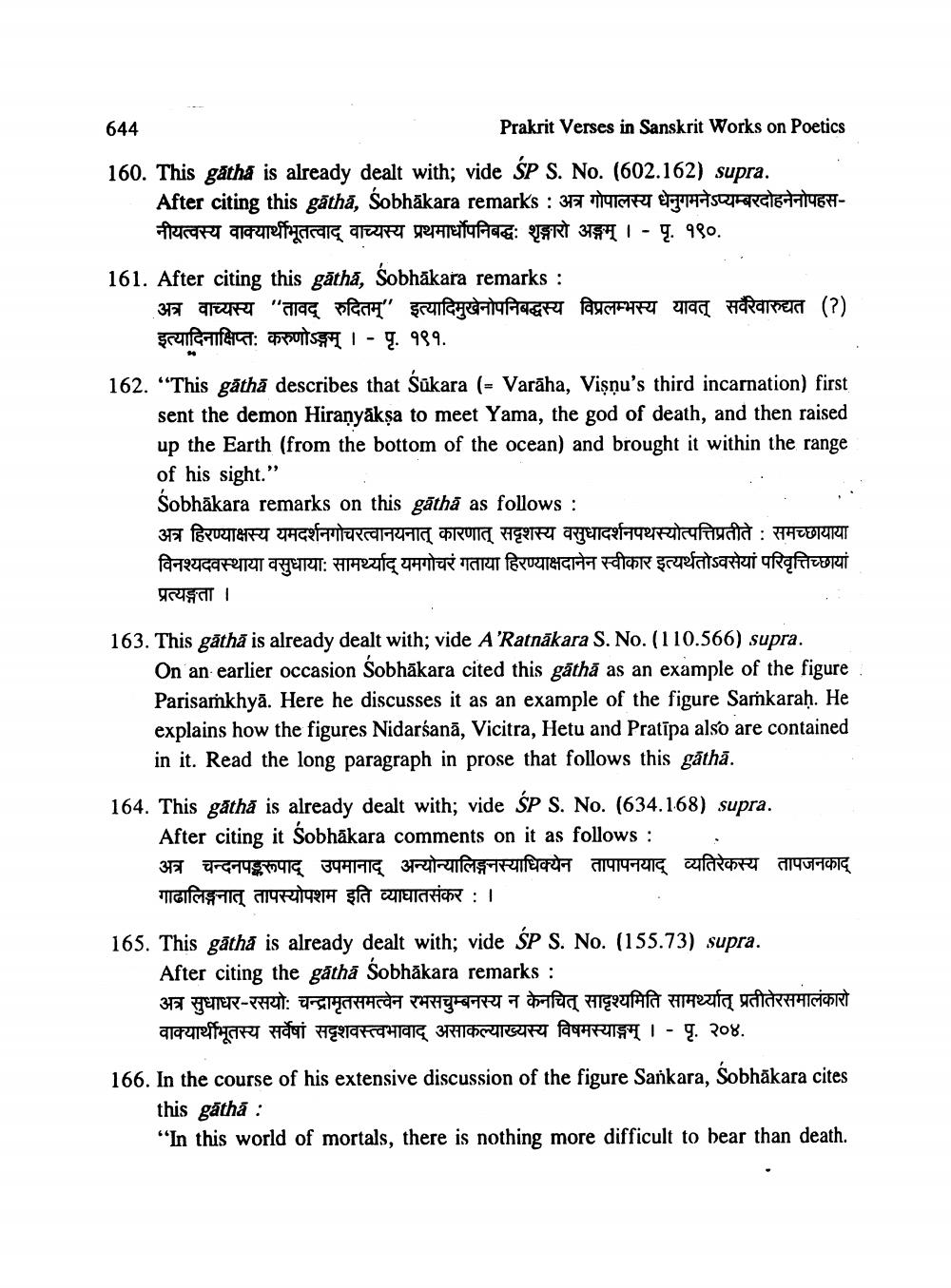________________
644
Prakrit Verses in Sanskrit Works on Poetics
160. This gātha is already dealt with; vide ŚP S. No. (602.162) supra.
After citing this gatha, Sobhakara remarks : अत्र गोपालस्य धेनुगमनेऽप्यम्बरदोहनेनोपहस
नीयत्वस्य वाक्यार्थीभूतत्वाद् वाच्यस्य प्रथमा|पनिबद्धः शृङ्गारो अङ्गम् । - पृ. १९०. 161. After citing this gātha, Sobhākara remarks :
अत्र वाच्यस्य "तावद् रुदितम्" इत्यादिमुखेनोपनिबद्धस्य विप्रलम्भस्य यावत् सर्वैरेवारुद्यत (?)
इत्यादिनाक्षिप्त: करुणोऽङ्गम् । - पृ. १९१. 162. "This gatha describes that Sikara (= Varaha, Visnu's third incarnation) first
sent the demon Hiranyākṣa to meet Yama, the god of death, and then raised up the Earth (from the bottom of the ocean) and brought it within the range of his sight." Sobhākara remarks on this gātha as follows : अत्र हिरण्याक्षस्य यमदर्शनगोचरत्वानयनात् कारणात् सदृशस्य वसुधादर्शनपथस्योत्पत्तिप्रतीते : समच्छायाया विनश्यदवस्थाया वसुधाया: सामर्थ्याद यमगोचरं गताया हिरण्याक्षदानेन स्वीकार इत्यर्थतोऽवसेयां परिवृत्तिच्छायां प्रत्यङ्गता ।
163. This gatha is already dealt with; vide A'Ratnakara S.No. (110.566) supra.
On an earlier occasion Sobhākara cited this gåthā as an example of the figure Parisaṁkhyā. Here he discusses it as an example of the figure Samkaraḥ. He explains how the figures Nidarśanā, Vicitra, Hetu and Pratīpa also are contained in it. Read the long paragraph in prose that follows this gāthā.
164. This gātha is already dealt with; vide ŚP S. No. (634.168) supra.
After citing it Sobhākara comments on it as follows : अत्र चन्दनपङ्करूपाद् उपमानाद् अन्योन्यालिङ्गनस्याधिक्येन तापापनयाद् व्यतिरेकस्य तापजनकाद् गाढालिङ्गनात् तापस्योपशम इति व्याघातसंकर : ।
165. This gātha is already dealt with; vide ŚP S. No. (155.73) supra.
After citing the gātha Sobhākara remarks : अत्र सुधाधर-रसयो: चन्द्रामृतसमत्वेन रभसचुम्बनस्य न केनचित् सादृश्यमिति सामर्थ्यात प्रतीतेरसमालंकारो वाक्यार्थीभूतस्य सर्वेषां सदृशवस्त्वभावाद् असाकल्याख्यस्य विषमस्याङ्गम् । - पृ. २०४.
166. In the course of his extensive discussion of the figure San
ākara cites this gatha: "In this world of mortals, there is nothing more difficult to hear than death.




